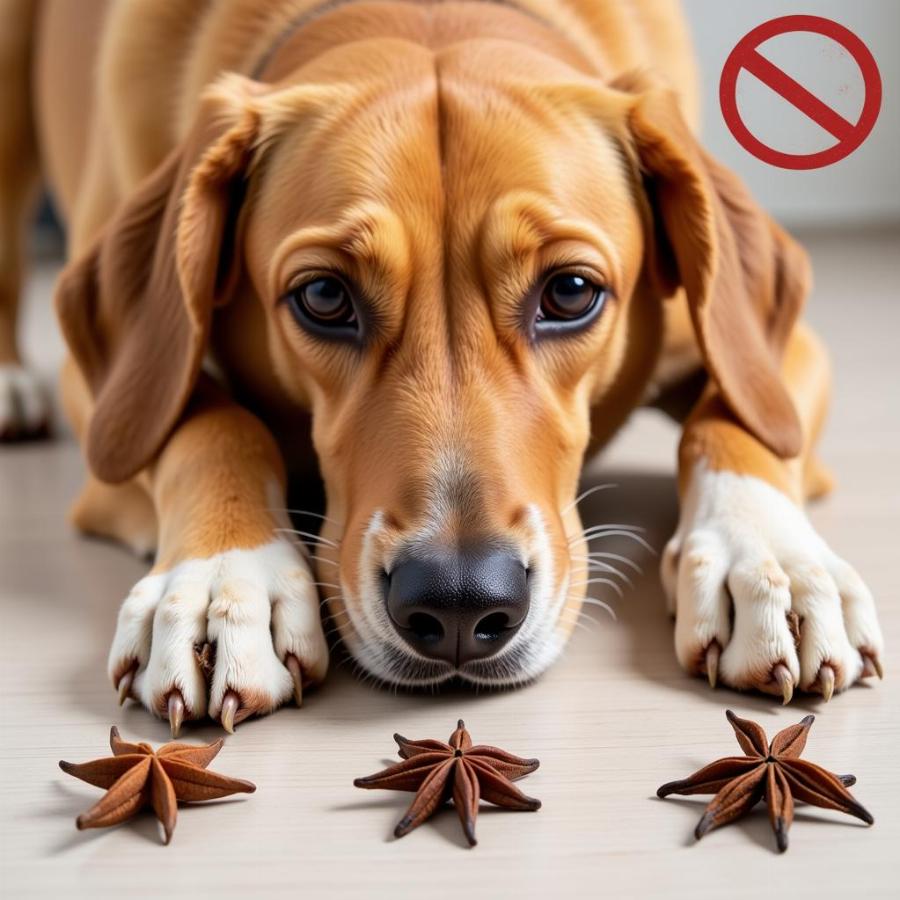Cloves and dogs are a combination that requires careful consideration. While cloves are a common spice in our kitchens, their potent properties can pose potential risks to our canine companions. Understanding the effects of cloves on dogs is crucial for responsible pet ownership. This article dives into the details of clove toxicity in dogs, exploring the potential dangers, symptoms, and what to do if your dog ingests cloves.
Can dogs eat cloves? The short answer is no. Cloves contain eugenol, a compound that can be toxic to dogs. While a small amount might not cause severe issues, larger quantities can lead to a range of health problems. It’s best to err on the side of caution and keep cloves completely out of your dog’s reach. Even clove oil, which is highly concentrated, presents a greater risk and should be avoided entirely. If you suspect your dog has ingested cloves, contact your veterinarian immediately.
Understanding Clove Toxicity in Dogs
Why are cloves bad for dogs? The primary culprit is eugenol, a volatile oil found in cloves. Eugenol is responsible for the distinctive aroma and flavor of cloves, but it can also cause liver damage, neurological issues, and gastrointestinal upset in dogs. The concentration of eugenol is significantly higher in clove oil, making it even more dangerous. Even topical application of clove oil can be harmful, as dogs can absorb it through their skin.
What are the Signs of Clove Poisoning in Dogs?
If your dog ingests cloves, watch for these symptoms:
- Vomiting
- Diarrhea
- Lethargy
- Weakness
- Tremors
- Seizures
- Difficulty breathing
- Liver damage (in severe cases)
How Much Clove is Toxic to a Dog?
The toxicity of cloves depends on the dog’s size, weight, and the amount ingested. Even a small amount of clove oil can be toxic, while a larger dog might tolerate a small amount of whole cloves without showing severe symptoms. However, it’s always best to prevent any clove ingestion.
What to Do If Your Dog Eats Cloves
If you suspect your dog has ingested cloves, act quickly. Contact your veterinarian or the ASPCA Animal Poison Control Center immediately. Do not induce vomiting unless instructed by a professional. Provide your veterinarian with as much information as possible, including the type of clove product (whole, ground, or oil), the estimated amount ingested, and any symptoms your dog is displaying. Timely intervention is crucial for a positive outcome.
Home Remedies: Are They Safe?
While some home remedies might seem appealing, it’s crucial to avoid any self-treatment without consulting a veterinarian. Giving your dog anything without professional guidance could worsen the situation.
Preventing Clove Exposure in Dogs
Prevention is always better than cure. Keep cloves, clove oil, and any products containing cloves stored safely out of your dog’s reach. Be mindful when cooking or using clove-containing products, ensuring that your dog doesn’t have access to spills or scraps. Educate family members about the potential dangers of cloves for dogs.
Are There Any Safe Spices for Dogs?
While cloves are off-limits, some spices can be beneficial for dogs in moderation. For instance, ginger can aid digestion, and turmeric possesses anti-inflammatory properties. However, always consult with your veterinarian before adding any new spices to your dog’s diet. Learn more about what your dog can eat with our articles on homemade bug repellent for dogs and dog pumpkin pie.
Can Dogs Smell Cloves?
Yes, dogs can smell cloves, and their powerful sense of smell can make the strong aroma even more overwhelming for them. This sensitivity further reinforces the importance of keeping clove products away from your furry friend. Consider using insense smells safe for dogs instead.
 Dog Smelling Spices – Dangers of Cloves
Dog Smelling Spices – Dangers of Cloves
Conclusion
Cloves and dogs are a risky mix. The eugenol in cloves can cause various health problems, and even small amounts can be harmful. Always prioritize your dog’s safety by keeping cloves out of reach and seeking immediate veterinary attention if ingestion occurs. Prevention and quick action are key to protecting your furry companion from the dangers of cloves. You might also be interested in learning whether can dogs have ginger snaps or can dogs eat ginger snaps which are safer alternatives.
FAQs
- Are clove cigarettes safe for dogs to be around? No, clove cigarettes pose the same risks as other forms of cloves due to the presence of eugenol.
- Can I use clove oil to treat my dog’s fleas? Never use clove oil on your dog without consulting a veterinarian. Topical application can be harmful.
- What are the long-term effects of clove poisoning in dogs? Long-term effects can include liver damage and neurological issues.
- Are all parts of the clove plant toxic to dogs? Yes, all parts of the clove plant, including the stems and leaves, contain eugenol and are toxic to dogs.
- What should I do if my dog licks a small amount of clove oil? Contact your veterinarian immediately, even if your dog only licked a small amount.
Beaut Dogs is your trusted source for comprehensive and reliable information about the world of canine companions. We are dedicated to providing expert guidance on all aspects of dog ownership, from breed selection to health care. For personalized support and detailed answers to your dog-related questions, contact us at Email: [email protected]. Beaut Dogs (https://beautdogs.com) is here to help you navigate the joys and responsibilities of dog ownership.